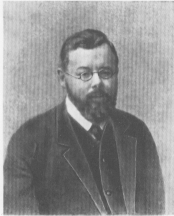| Profile | Major Works | Resources |
Mikhail Ivanovich Tugan-Baranovsky, 1865-1919.

The contributions of the Russian economsit Mikhail Tugan-Baranovsky (sometimes spelt "Tugan-Baranawsky" or some variant thereof) fall into two related camps: business cycle theory and the Marxian theory of crises.
Originally of Ukranian-Tartar origins, Tugan-Baranovsky graduated from the University of Kharkov in 1888.
Tugan-Baranovsky's 1894 treatise on business cycles, is the published version of his 1892 master's thesis at Moscow University. In preparation, Tugan-Baranovsky had six months researching data at the British museum in London. It is famous for providing arguably the first coherent and thoroughly "economic" theory of the business cycle. His theory, which relied on a Say's Law-breaking theory of credit and a primitive notion of the Keynesian "multiplier", argued that cycles were driven by an independent investment function and that, ultimately, "overinvestment" was the cause of recessions. His breakthrough work gave rise to a whole line of European business cycle theory stemming from Spiethoff through Cassel and Robertson all the way to the Kiel School and Hayek.
His theory of the cycle also provided the groundwork for his later 1905 challenge to Marx's theory of capitalist crises. His cycle theory had already demonstrated that there is not necessarily a secular movement towards "destruction" but rather only wave-like patterns in capitalist economies. In his 1905 work, he extended this to argue that there are conditions whereby capitalist economies can arrive at a "stationary state" and thus arrest their move to crisis.
Tugan-Baranovsky's challenge set the spark for a vociferous debate among Marxians between followers of his line (e.g. Hilferding) and upholders of the old inevitability doctrine (e.g. Kautsky and Adler). This was extended later to a debate on imperialism. Tugan-Baranovsky eventually abandoned his Marxian roots and adopted the more socialist views of his previous opponents, the Populists (Narodniks), on co-operative economies.
Tugan-Baranovsky's other contributions to economics include his 1898 dissertation on the economic history of the Russian factory (submitted for a doctorate at Moscow University). This earned him an appointment as a lecturer at St. Petersburg University. He was dismissed in 1899 due to his political proclivities, but restored in 1905.
Tugan-Baranovsky also pursued the quixotic effort to try to merge Marxian and Neoclassical theories of value into a single theory, that takes account of both objective and subjective factors, redefining surplus value in consumption terms. This was already presaged in a 1890 article, and elaborated in his 1909 textbook. The notion was not well-received. Nonetheless, in 1913, Tugan-Baranovsky was elected to the chair in political economy at St. Petersburg, but the appointment was overruled by the Tsarist Minister of Education. In 1917, Tugan-Baranovsky left St. Petersburg, and took a position in the Law Faculty in Kiev. It is at this time that he got heavily engaged in the cooperative movements, and served briefly as minister of finance for the putative Ukranian narodnik republic. He died in 1919 in Odessa, while on his way to France.
|
Major works of Mikhail Tugan-Baranovsky
Теоретическія основы марксизма, 1905 [1906 ed] [German 1905 trans. Theoretische Grundlagen des Marxismus, bk] [English trans. Theoretical Groundwork of Marxism]
|
|
HET
|
|
Resources of Mikhail Tugan-Baranovsky
|
All rights reserved, Gonšalo L. Fonseca
